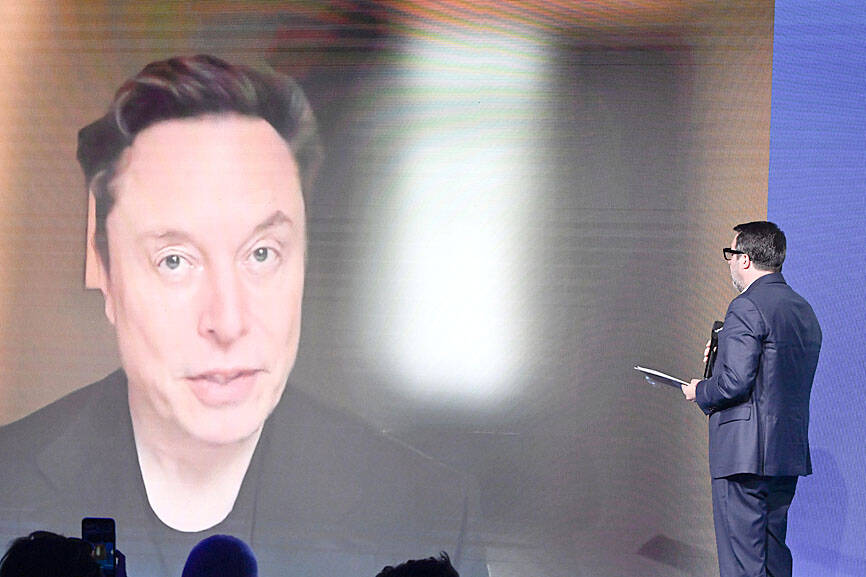US tech billionaire Elon Musk on Saturday said that he hoped to see complete freedom of trade between the US and Europe, speaking days after US President Donald Trump announced tariffs on trading partners.
Musk, a Trump adviser who has been working to eliminate wasteful US public spending, spoke via video link at a congress in Florence of Italy’s right-wing, co-ruling League Party.
“At the end of the day, I hope it’s agreed that both Europe and the United States should move ideally, in my view, to a zero tariff situation, effectively creating a free trade zone between Europe and North America,” Musk said.

Photo: EPA-EFE
Under Trump’s plans announced on Wednesday, Italy, which has a large trade surplus with the US, would be subject to a general tariff of 20 percent along with other EU countries.
Interviewed by League leader Matteo Salvini, Musk, who has repeatedly expressed support for right-wing parties across Europe, said he also hoped to see greater freedom of movement between Europe and the US.
“If people wish to work in Europe or wish to work in North America, they should be allowed to do so in my view,” Musk said, adding that this “has certainly been my advice to the president.”
Musk, who is close to Italian Prime Minister Giorgia Meloni and her Brothers of Italy party, has also expressed support for Salvini’s League.
Both groups have a hard-right agenda based on law and order, tax cuts and cracking down on irregular immigration.
Italian Minister of Economy and Finance Giancarlo Giorgetti, who is from the League, earlier on Saturday said that the government wanted “de-escalation” with the US following Trump’s tariff announcement, and warned against imposing retaliatory tariffs.
Musk last month expressed gratitude to Salvini after the League chief said Italy should pick his Starlink company to obtain a system for satellite communications.

SELL-OFF: Investors expect tariff-driven volatility as the local boarse reopens today, while analysts say government support and solid fundamentals would steady sentiment Local investors are bracing for a sharp market downturn today as the nation’s financial markets resume trading following a two-day closure for national holidays before the weekend, with sentiment rattled by US President Donald Trump’s sweeping tariff announcement. Trump’s unveiling of new “reciprocal tariffs” on Wednesday triggered a sell-off in global markets, with the FTSE Taiwan Index Futures — a benchmark for Taiwanese equities traded in Singapore — tumbling 9.2 percent over the past two sessions. Meanwhile, the American depositary receipts (ADRs) of Taiwan Semiconductor Manufacturing Co (TSMC, 台積電), the most heavily weighted stock on the TAIEX, plunged 13.8 percent in

A wave of stop-loss selling and panic selling hit Taiwan's stock market at its opening today, with the weighted index plunging 2,086 points — a drop of more than 9.7 percent — marking the largest intraday point and percentage loss on record. The index bottomed out at 19,212.02, while futures were locked limit-down, with more than 1,000 stocks hitting their daily drop limit. Three heavyweight stocks — Taiwan Semiconductor Manufacturing Co (TSMC, 台積電), Hon Hai Precision Industry Co (Foxconn, 鴻海精密) and MediaTek (聯發科) — hit their limit-down prices as soon as the market opened, falling to NT$848 (US$25.54), NT$138.5 and NT$1,295 respectively. TSMC's

ASML Holding NV, the sole producer of the most advanced machines used in semiconductor manufacturing, said geopolitical tensions are harming innovation a day after US President Donald Trump levied massive tariffs that promise to disrupt trade flows across the entire world. “Our industry has been built basically on the ability of people to work together, to innovate together,” ASML chief executive officer Christophe Fouquet said in a recorded message at a Thursday industry event in the Netherlands. Export controls and increasing geopolitical tensions challenge that collaboration, he said, without specifically addressing the new US tariffs. Tech executives in the EU, which is

In a small town in Paraguay, a showdown is brewing between traditional producers of yerba mate, a bitter herbal tea popular across South America, and miners of a shinier treasure: gold. A rush for the precious metal is pitting mate growers and indigenous groups against the expanding operations of small-scale miners who, until recently, were their neighbors, not nemeses. “They [the miners] have destroyed everything... The canals, springs, swamps,” said Vidal Britez, president of the Yerba Mate Producers’ Association of the town of Paso Yobai, about 210km east of capital Asuncion. “You can see the pollution from the dead fish.